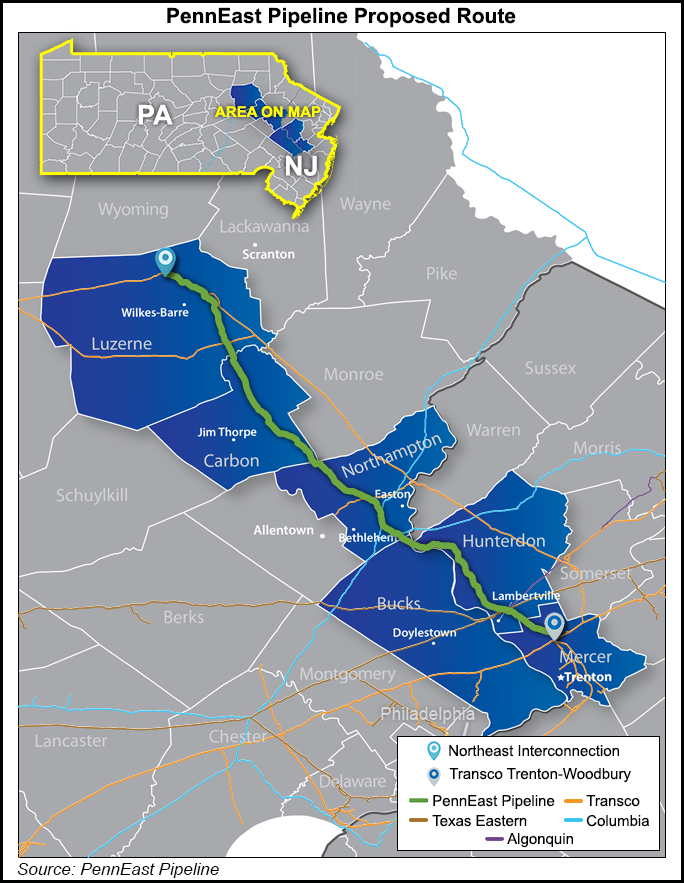Regulatory | Infrastructure | NGI All News Access
PennEast Turns to FERC to Secure Land for Beleaguered Project
PennEast Pipeline Co. LLC has turned to FERC for help in navigating its latest legal setback, arguing that a recent decision by the U.S. Court of Appeals for the Third Circuit that has slowed progress on the Appalachian project could disrupt others across the natural gas industry.

In a petition for declaratory order and expedited action filed last week, the company asked the Federal Energy Regulatory Commission for an “authoritative interpretation” of the eminent domain authority issued to certificate holders under the Natural Gas Act (NGA). Further clarity on the matter, PennEast argued in its petition, would help courts consider whether the law allows pipeline projects to condemn property owned by states.
In a blow last month that prevents PennEast from condemning state-owned land in New Jersey, the Third Circuit concluded that the Eleventh Amendment of the U.S. Constitution bars a certificate holder from bringing an action in federal court under the NGA to seize property in which a state or its agencies hold an interest. At the time, observers noted that the ruling could prove consequential, and PennEast agreed in its petition.
“The Third Circuit’s decision presents immediate and serious obstacles to the administration of one of the most fundamental provisions of the NGA, and uproots nearly 80 years of Commission practice,” PennEast said. “In particular, the decision calls into question the efficacy of the NGA’s condemnation authority, which the Commission has recognized to be ”a necessary part of the statutory scheme to regulate the transportation and sale of natural gas in interstate commerce.’”
Certificates issued by FERC under the NGA allow private gas companies to exercise the federal government’s power to take property by eminent domain. PennEast obtained approval for the project in January 2018 and sued New Jersey to condemn land the state said is preserved for recreation, conservation and agricultural purposes. New Jersey sought to dismiss PennEast’s complaint for lack of jurisdiction, citing the Eleventh Amendment, which recognizes states have sovereign immunity from lawsuits by private parties in federal court.
The Third Circuit ruled that New Jersey’s sovereign immunity wasn’t revoked by the project’s certificate and also found that the federal government’s exemption from sovereign immunity was not delegated to PennEast. The circuit court remanded the matter to a lower court for dismissal of any claims against New Jersey.
Expedited action is necessary for the Commission’s views to be heard in other proceedings involving the Third Circuit’s decision, PennEast argued. Without more clarity on the matter, the company warned in its petition that other landowners and states could pursue similar arguments and “impede the ability of natural gas companies to develop natural gas infrastructure.”
The company has asked for a declaratory order by Nov. 1 that states: a certificate holder may condemn property in which a state holds an interest, Congress delegated the federal government’s eminent domain authority to certificate holders, and, in doing so, delegated the federal government’s exemption from sovereign immunity claims to pipeline developers.
PennEast has been in the works for about five years, but it has yet to receive a water quality certification and other permits in New Jersey, where its latest application was deemed incomplete last month. The project would move more than 1 Bcf/d of Appalachian gas to markets in Pennsylvania and New Jersey.
© 2024 Natural Gas Intelligence. All rights reserved.
ISSN © 1532-1231 | ISSN © 2577-9877 |
